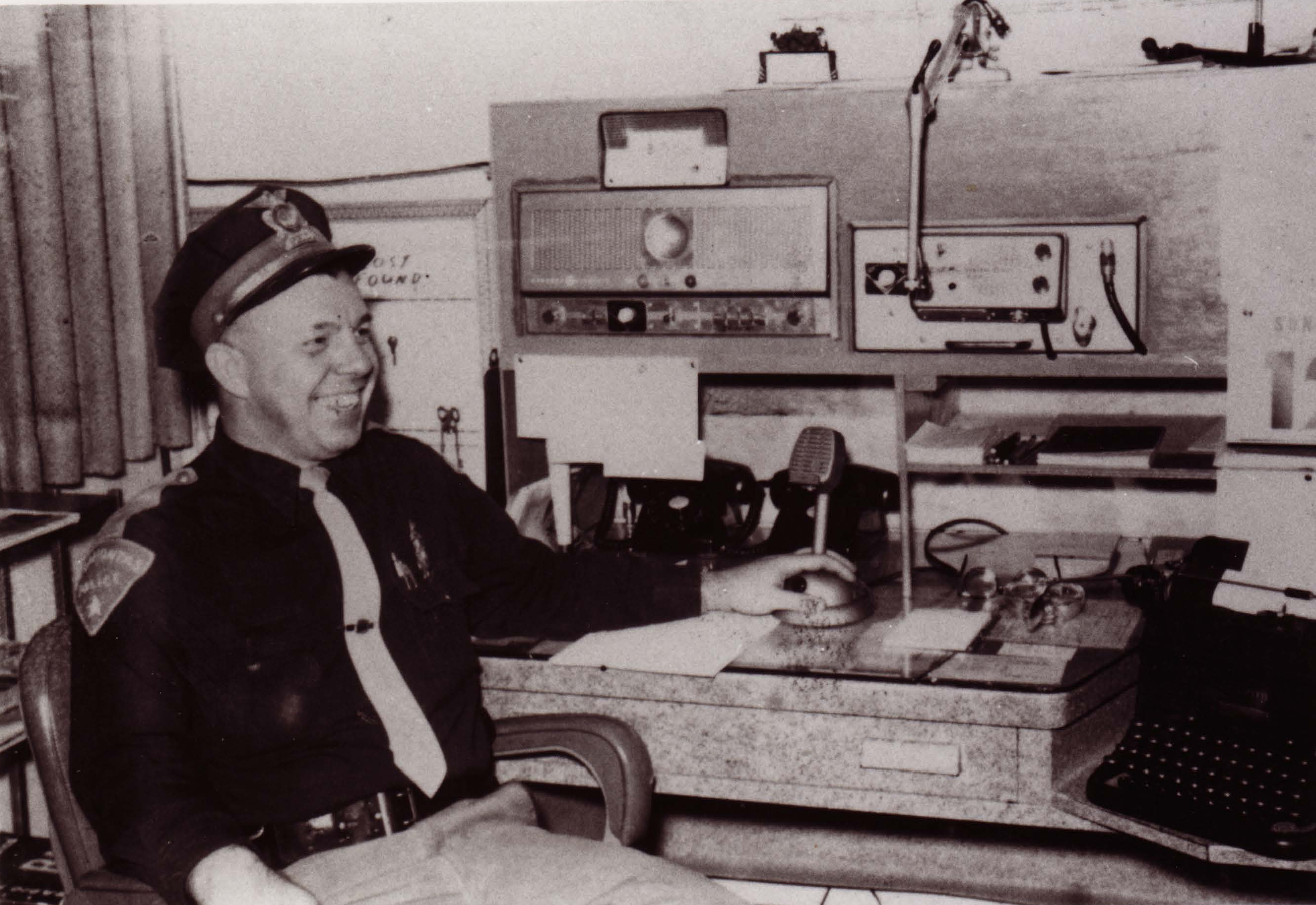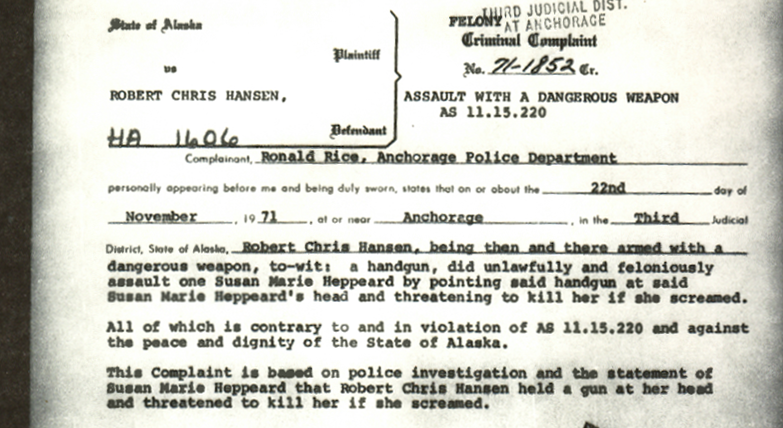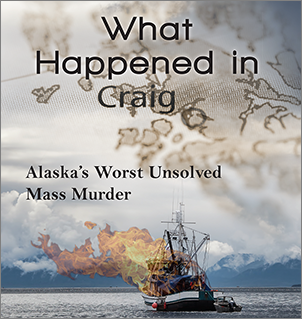Mind of a Monster, Episode 3
For Episode 3 of Mind of a Monster: The Butcher Baker, Dr. Michelle Ward takes us on the path that led Anchorage authorities to (finally) suspect one Robert C. Hansen of serial murder. It was a slog. The first police officer to arrive at that conclusion was Anchorage Police Officer Gregg Baker. He’d met Hansen escapee Cindy Paulson. He believed her. But his superiors at APD shut him down. Hansen had two alibis. Had a wife and children. Was from all appearances a devout church-going man who owned a bakery. This kind of behavior, they assured each other, was not part of Hansen’s world.
Dissatisfied with the outcome, Baker did his own research. Discovered that Hansen’s world included a long history of disturbing encounters with women. He’d put women in restraints. Had allegedly raped and kidnapped them. Baker reflexively did something that could have gotten him in trouble. He turned over a bundle of court records to the Alaska State Troopers. After finding Sherry Morrow’s body on the Knik River, troopers had joined a task force dedicated to finding her killer. They needed to know about this guy.
That in itself raised another question. Who in the world was this man, this Robert C. Hansen?

A Monster Revealed
A former student of Darla Hansen, Diana Hansen (no relation) offers one insight into Hansen’s world. Darla Hansen, Bob’s wife, was her teacher, one who specialized in helping students with learning disabilities. After noting what a kind, caring woman she was, Diana points out that the couple had wildly different schedules. Bob was always up late at night, prepping the next morning’s bakery goods. That was when Darla was asleep, getting rest for another school day. Despite that, they maintained the image of the neat nuclear family. That helped when the cops came around.
To be sure, it wasn’t all candy and roses at the Hansen household.
I guess I really don’t know why he lost his temper. In his mind, if he wanted the house perfect, he kind of wanted you to read his mind. If he wanted something, he wanted to make sure you got it right now. When he wanted it.
Darla Hansen to Leland E. Hale, 1984
It’s not surprising to learn that Robert C. Hansen intimidated his wife. That he was verbally abusive (though there is no evidence he was physically abusive — at least toward her). His employees had seen similar behavior in the workplace. And those widely divergent work schedules? The perfect opportunity for Bob to hit downtown Anchorage and gawk at the sex workers. Or more.

Going Deeper
The challenge here, though, is in divining the deeper causes of Hansen’s deadly predilections. There is evidence of self-harm in his youth (stabbing his hand with a pencil). A domineering father who raised him like he was raised, in the old country way, as a bakery apprentice. His own statements about feeling isolated from his peers. But, as Turvey notes, “statements are not evidence.” They provide no ah-ha moment. Except. The evidence points to the fact that Hansen was sleep deprived during long stretches of his school career. That, Turvey notes, can induce mental disorders. Can create issues of memory, understanding, and cognition.
Also of note was how Hansen was taught — or learned — to (dis)regard women. In his confession, Hansen says that during high school he could count the number of dates he had “on one hand.” That, he thought, was because he looked and acted a little bit different, with his acne scarred face and his stutter. That, notes profiler Dr. Brent Turvey, is actually indicative of a person speaking from a perspective of entitlement. But there is a clincher.
Fantasies
During a 1972 psychiatric evaluation after his attempted kidnapping of a real estate secretary in Anchorage, Hansen told the psychiatrist that he “fantasized about doing all sorts of harmful things to the girls who rejected him.”
[Hansen] regarded women as objects, not people. That was a prevailing philosophy at the time. And it’s part of the incel ideological belief [system]. “Women, you should be quiet and just get me my coffee.”
Dr. Brent Turvey, Mind of a Monster, Episode 3

Another Red Flag
The other big red flag was Robert Hansen’s 1961 arson in Pocahontas, Iowa, his home town. Hansen himself claimed that he set the fire because he wanted to get back at the school, which was “out to do me personal wrong.” As Turvey points out, what’s remarkable here is that, by the time of the arson, Hansen had been holding a grudge for three (or more) years. Had, in fact, graduated high school in 1957, gone into the Army Reserves and returned home. Arson, Turvey notes, usually has two motives: money or rage. There’s not much money in burning down a school bus barn.
I am reminded here of what Chief Wiseman told me when I interviewed him back in 1984. Wiseman often visited Hansen’s bakery. One day, Bob invited him into the back, where he’d set up some hay bales and a target.
Bob proceeded to take out a bow and shoot an arrow toward the target. What he said next made the hair stand up on my neck. “You can barely hear it,” Hansen said as the arrow hit its mark.
Chief Marvin Wiseman, Pocahontas Police Dept.
Robert C. Hansen v. The World
So, Robert C. Hansen resented authority. Resented women. Even made it a point to divide women into two groups: the good ones, deserving of respect. And those who were beneath him. The one’s he could do with as he pleased. A 1971 incident proved a turning point. He’d gone too far with one of the “good girls.”

APD Det. Ron Rice found Robert Hansen to be meek and mild in the face of authority. Rice’s ensuing encounter with Darla was instructive only because she didn’t say much, seemed distracted by their infant daughter. At that time, back in 1971, Hansen was facing two serious charges. One, the attempted kidnapping of a real estate secretary (above). The other the kidnapping and rape of a young sex worker. There was a plea deal. Hansen took it. Ron Rice had different priorities: “It’s a jury question. Let the jury decide.”
The D.A. ignored him. This, Rice knows, taught Robert Hansen a vital lesson. Keep your head down, keep your mouth shut. Only go after women who are sex workers. The Anchorage authorities will just look the other way. In fact, they did so for more than a decade. Until they couldn’t. Until there was too much evidence to ignore.
Tune In Now
I won’t add more because, really, you should check out the podcast for yourself. This is great story telling that adds a lot to the base story Walter Gilmour and I shared with the world more than thirty years ago.
[Amazon Podcast] [Apple Podcast] [Google Podcast] [Spotify Podcast]
Dr. Michelle Ward has a PhD in Clinical Neuroscience/Psychology from USC. She has served as an expert trial consultant in criminal cases involving a multitude of violent murderers. Her podcast series features her own personal and professional insights, as well as comments from family and friends of both the killer and the victim.
Copyright Leland E. Hale (2024). All rights reserved.

Purchase Butcher, Baker
Order my latest book, “What Happened In Craig,” HERE and HERE. True crime from Epicenter Press about Alaska’s Worst Unsolved Mass Murder.
